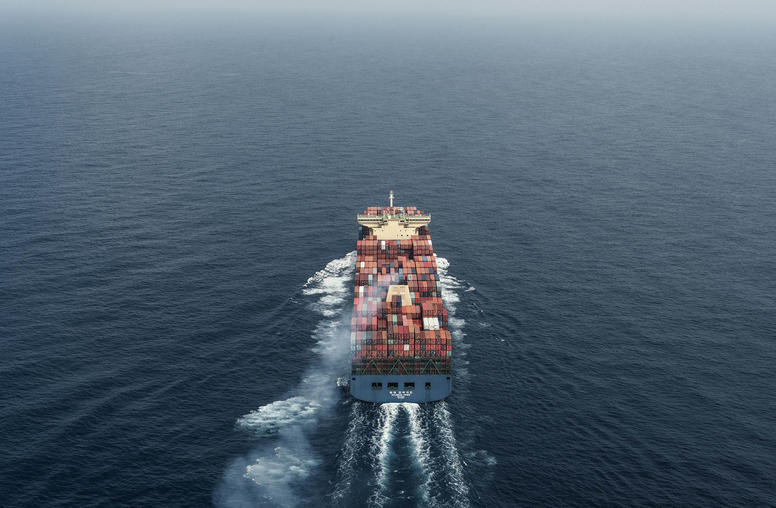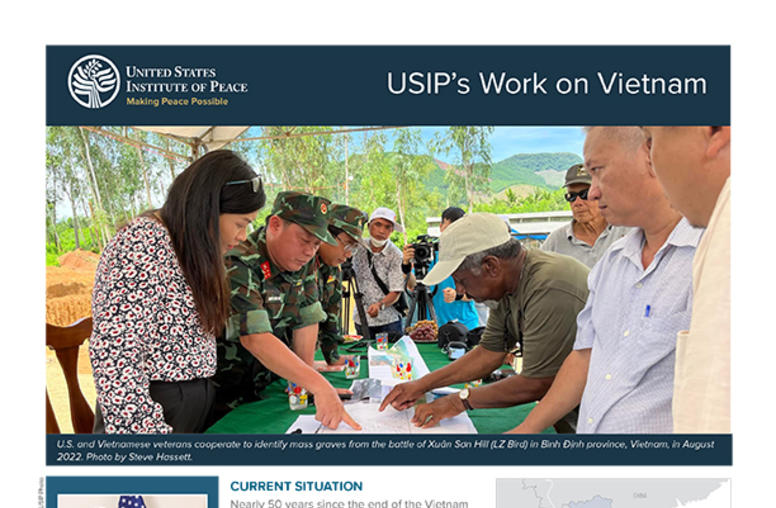Peaceworks
Publications
Articles, publications, books, tools and multimedia features from the U.S. Institute of Peace provide the latest news, analysis, research findings, practitioner guides and reports, all related to the conflict zones and issues that are at the center of the Institute’s work to prevent and reduce violent conflict.

Why the U.S. Wants to Step Up Engagement in the Indian Ocean
Earlier this month, Deputy Assistant Secretary of State Afreen Akhter led a U.S. delegation to the sixth Indian Ocean Conference. Since its inception in 2016, the Indian Ocean Conference has become a prominent gathering for regional stakeholders to discuss collective issues — from trade and economic cooperation to security considerations. This year’s proceedings in Dhaka, Bangladesh, featured representatives from 25 countries amid a backdrop of geopolitical concerns that have thrust the Indian Ocean into a prominent role in global affairs.

Vikram Singh on the U.S.-Japan-Philippines Trilateral Summit
The United States, Japan and the Philippines are holding their first-ever trilateral summit this week. China’s “unprecedented” pressure and aggression over maritime claims will top the agenda. “There’s a fairly clear resolve … to not just let China bully its way to changing the status quo in the region,” says USIP’s Vikram Singh.

Whither NATO at 75?
NATO marked its 75th anniversary last week at a celebration in Brussels. While Russia’s invasion of Ukraine has injected the alliance with new life and resolve, the 32-member collective security pact is also wrestling with its future in a world of growing great power competition. In 2022, NATO formally identified for the first time China as a challenge to its interests and collective security. As NATO continues to support Ukraine and look to future global challenges, it also has internal issues to address, ranging from individual member defense spending to the problems posed by the need for collective decision-making among 32 members.

Myanmar’s Collapsing Military Creates a Crisis on China’s Border
Operation 1027 — an offensive launched in October 2023 by an alliance of three ethnic armed organizations (EAOs) against the military junta in Myanmar — has disrupted hundreds of forced labor scam syndicates operating under the protection of Myanmar’s army, dented the army’s image of invincibility and decimated the lucrative China-Myanmar border trade. A second operation launched on March 7 by another EAO in Kachin State has compounded China’s economic woes by adding to the impact on trade.

Increasing Information Access for the North Korean People
In recent years, North Korea has become more repressive, more impoverished and more allergic to the outside world. Already turning inward after the failure of diplomatic efforts in 2019, the North Korean government isolated itself further amid the global COVID-19 pandemic. North Korea has learned to operate, and Kim Jong Un has learned to rule, with greater levels of self-isolation than aggressive international sanctions regimes could ever hope to impose. Given North Korea’s current mode of rejecting even humanitarian assistance and its recent turn toward Russia, the chances for diplomatic breakthroughs with Pyongyang look like a wishful long-term hope at best.

Iran’s Attack and the New Escalatory Cycle in the Middle East
The Middle East is entering a new phase after unprecedented attacks by Israel and Iran during the first two weeks of April. Robin Wright, a senior fellow at USIP and the Woodrow Wilson Center who has covered the region for a half century, explores what happened, the strategic implications, the political context and the divided world reaction.

The Current Situation in Vietnam
Nearly 50 years since the end of the Vietnam War, and more than a quarter-century since the normalization of U.S.-Vietnam relations, Vietnam is emerging as a rising power at the heart of the Indo-Pacific region and an increasingly important U.S. partner. Once one of the world’s poorest and most isolated countries, Vietnam is now a middle-income country with a dynamic, young population and a promising future.

Four Priorities for Sudan a Year into the Civil War
This week marks a year of war in Sudan. A once promising revolution that led to the overthrow in 2019 of the country’s longtime dictator, Omar al-Bashir, has devolved into a devastating civil war. The fighting started over a dispute on how to incorporate the paramilitary Rapid Support Forces (RSF) into the country’s military, the Sudan Armed Forces (SAF). A year later as the conflict between the RSF and SAF grinds on, Sudan is experiencing the world’s worst displacement crisis and one of the world’s worst hunger crises in recent history.

What Sweden’s Accession Shows About NATO’s Future
As NATO celebrates its 75th anniversary, it has cause to celebrate Sweden’s addition as the 32nd member of the alliance. The Nordic country’s accession came after a grueling, two-year fight with NATO member states Turkey and Hungary, both of which extracted concessions in exchange for allowing the process to move forward. Sweden’s entry will improve NATO’s capabilities and greatly reduce the vulnerability of its northeastern flank. But the difficulties it took to reach this point raise serious questions about the alliance’s ability to cohere around shared political and strategic objectives in a time of crisis.

Huawei’s Expansion in Latin America and the Caribbean: Views from the Region
Since its founding in Shenzhen, China, in 1987, Huawei has grown into one of the world’s major information and communications technology companies, but its ties to China’s government and military have been regarded by US officials as a potential risk to national security. Latin American and Caribbean countries, however, have embraced the company for the economic and technological benefits it provides. This report explains the stark contrast between Huawei’s standing in the United States and its neighbors to the south.